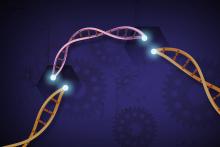Our scientists have engineered a new nucleic acid sensor, based on CRISPR technology, that is cell-free and can be rationally designed for broad applications in portable diagnostics, in sensing and in biotechnology. This novel, portable nucleic acid sensing platform uses a CRISPR technology that, unlike previous technologies, can be deployed outside of the lab without pre-packaged RNA inputs, and can generate multiplexed signals in any reporter mode (e.g. colorimetric, electrochemical, enzymatic, fluorescent). The flexibility afforded by this platform will allow for the sensitivity, resolution and programmability associated with other CRISPR-based diagnostics, but resolves the practical challenges related to their implementation.
OPPORTUNITY
The rising cost of health care and the need for de-centralized technologies to maintain public health have led to significant efforts to provide low-cost and portable diagnostics. Molecular diagnostics, which use pathogen genomes or the sequences of disease (e.g. cancer-related mutations) as a barcode for detection, represent one of the most exciting groups of technologies from these efforts. Such molecular technologies compare favorably to antibody-based diagnostics, which are costly to develop and are limited to protein antigens. Molecular diagnostics, in contrast, can be developed inexpensively and can probe for both the disease markers and clinical features, such as drug resistance.
COMPETITIVE ADVANTAGE
-
Sensitive point-of-need molecular diagnostics
-
RNA-free deployment of the technology for shelf-stability
-
Equipment-free use has the potential for low-cost applications in diverse settings
-
Capacity for diagnostic multiplexing
IP STATUS
- Provisional patent application filed





